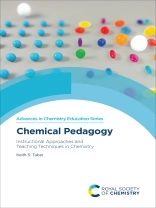How should chemistry be taught in schools, colleges, and universities? Chemical Pedagogy discusses teaching approaches and techniques, the reasoning behind them, and the evidence for their effectiveness.
The book surveys a wide range of different pedagogic strategies and tactics that have been recommended to better engage learners and provide more effective chemistry teaching. These accounts are supported by an initial introduction to some key ideas and debates about pedagogy – the science of teaching.
Chemical Pedagogy discusses how teaching innovations can be tested to inform research-based practice. Through this book, the author explores the challenges of carrying out valid experimental studies in education, and the impediments to generalising study results to diverse teaching and learning contexts. As a result, the author highlights both the need to read published studies critically and the value of teachers and lecturers testing out recommended innovations in their own classrooms.
Chemical Pedagogy introduces core principles – from research into human cognition and learning – to provide a theoretical perspective on how to best teach for engagement and understanding. An examination of some of the more contentious debates about pedagogy leads to the advice to seek ‘optimally guided instruction’ which balances the challenge offered to learners with the level of support provided. This provides a framework for discussing a wide range of teaching approaches and techniques that have been recommended to those teaching chemistry across educational levels, including both those intended to replace ‘teaching from the front’ and others that can be built into traditional lecture courses to enhance the learning experience.
Зміст
- An Introduction to Chemical Pedagogy
- Evaluating Pedagogy Through Experimental Studies of Teaching
- Debates About Pedagogy
- Optimally Guided Instruction
- Designing Teaching Schemes and Sequences
- Matching Teaching to Learners
- Making the Unfamiliar Familiar: Presenting Subject Matter
- Lectures and Laboratories: Their Discontents and Alternatives
- Engaging Different Voices in the Chemistry Classroom
- Designing and Curating Learning Resources
- Strategies for Organising Chemistry Teaching
- Learners Choosing and Creating












